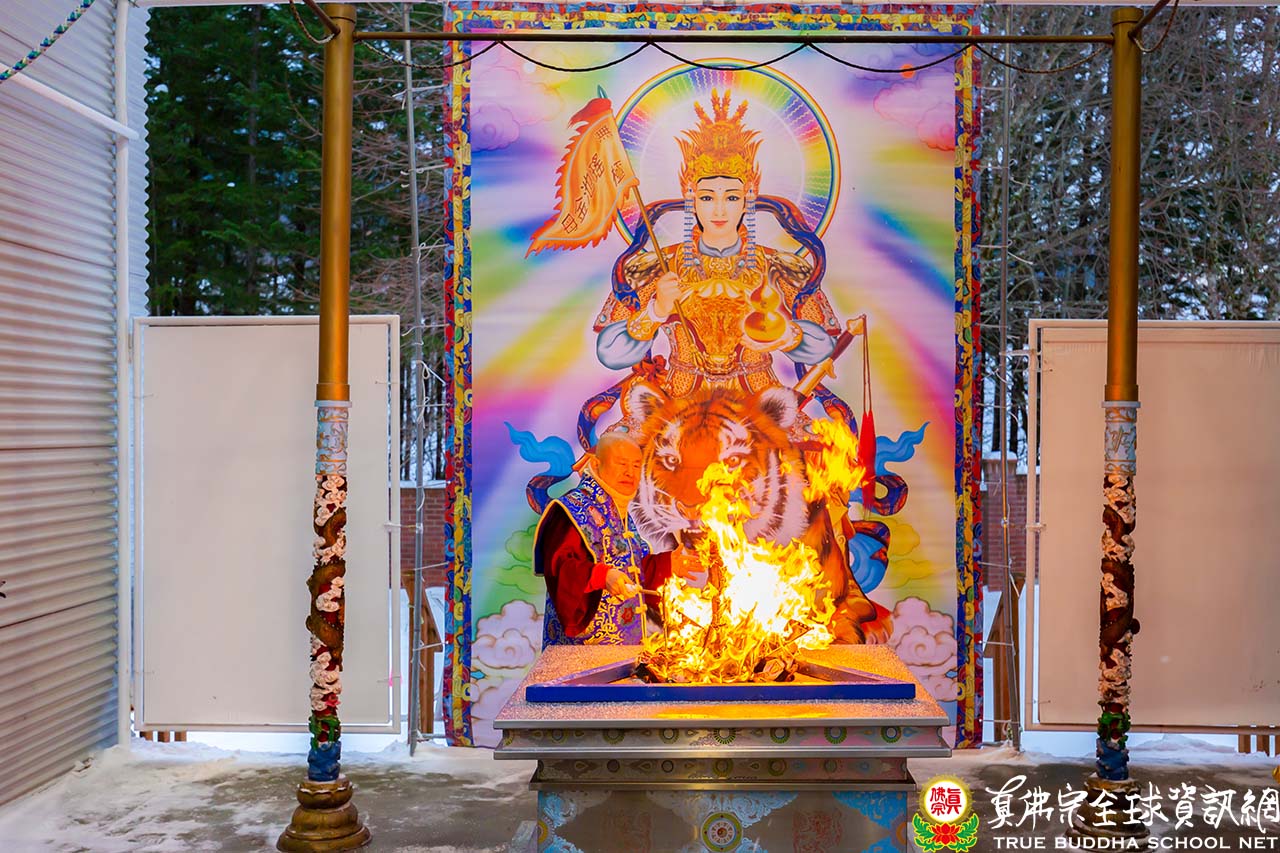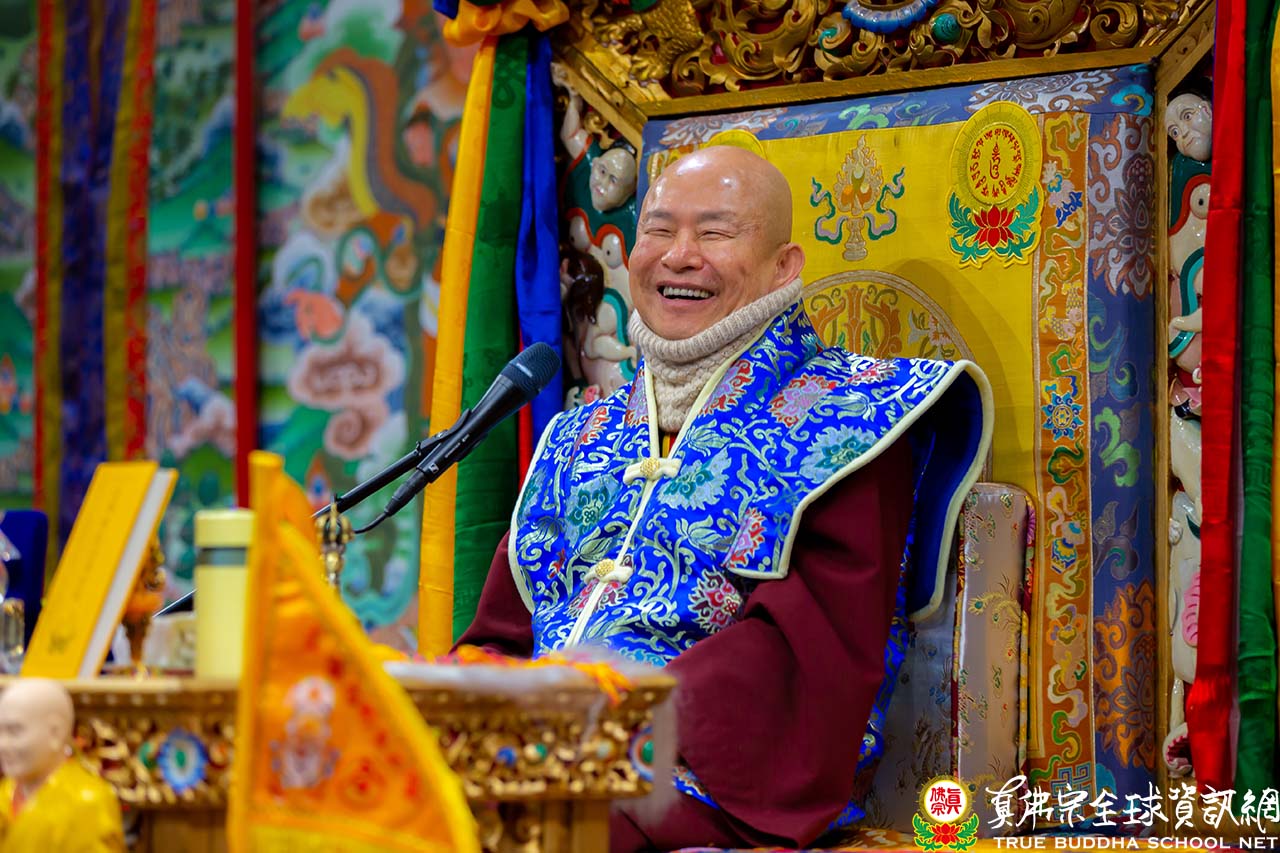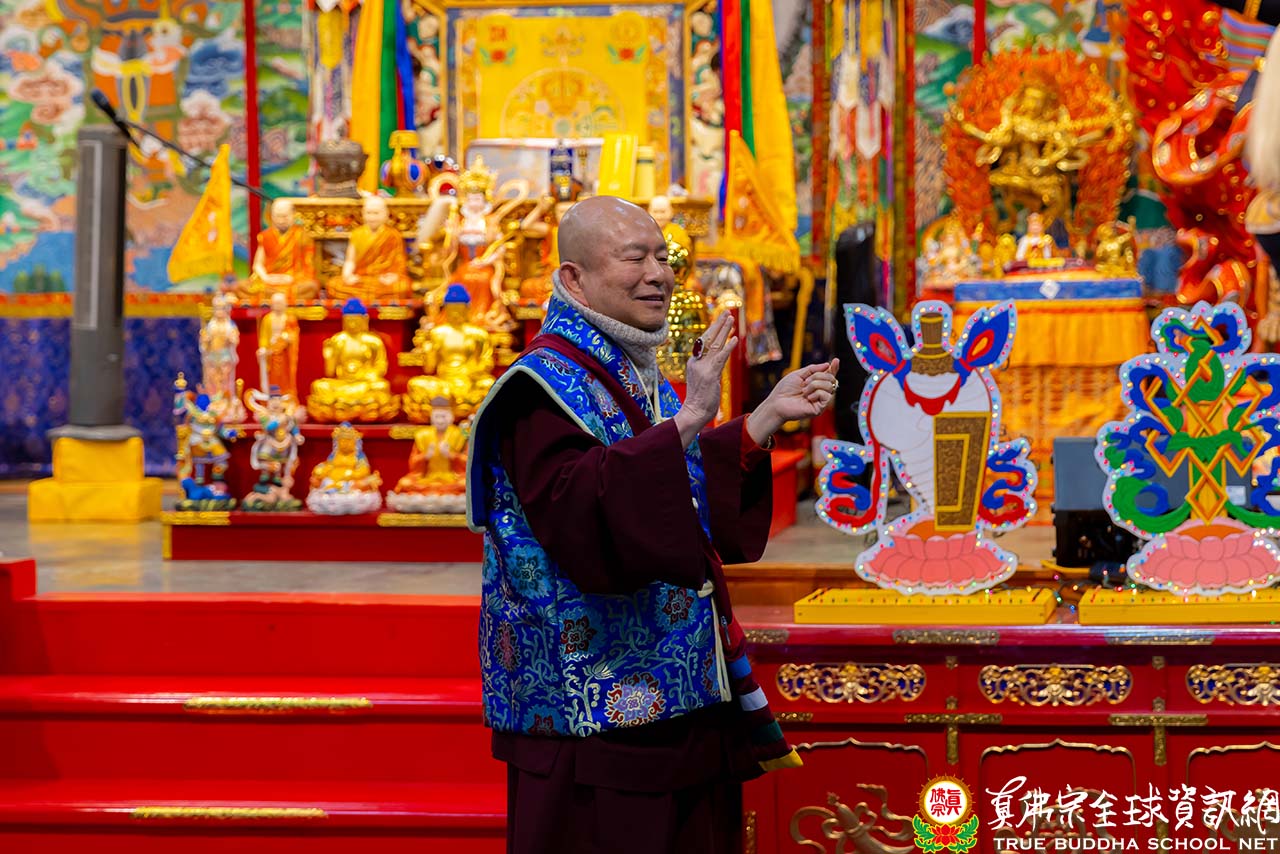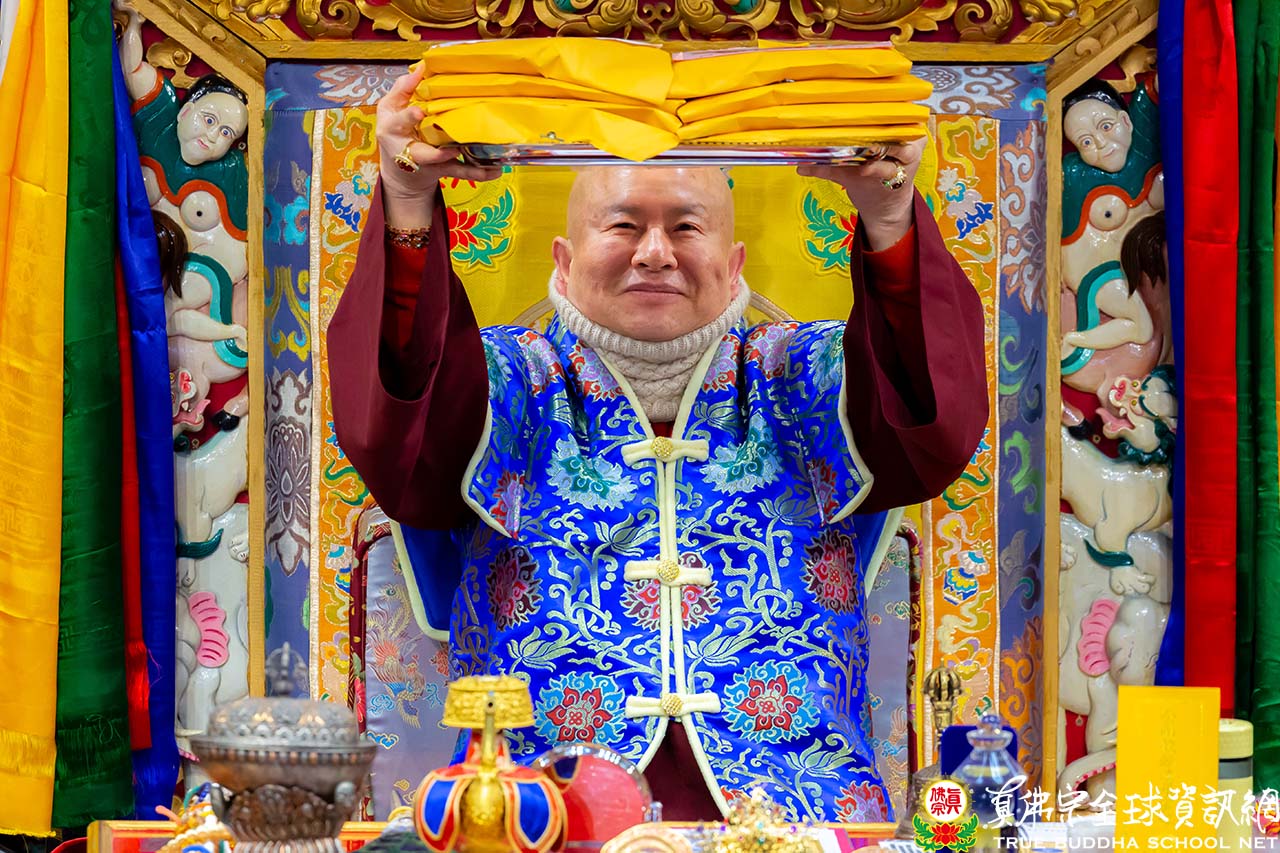
Vajracchedika Prajnaparamita Sutra
Vajra Sutra (Diamond Sutra)
Detailed Exposition by Living Buddha Lian-Sheng, Grandmaster Sheng-Yen Lu
Translated into English by True Buddha School Vajra Sutra Translation Team
Fourteen—Extinction Upon Abandoning Phenomena
Subhuti understood its profundity upon hearing this sutra and was moved to tears. He said to the Buddha, “World-honored One, it is rare indeed for the Buddha to speak on such a profound sutra. I have never heard of such a sutra ever since I attained my wisdom eyes.
“World-honored One, if someone generates pure faith upon hearing this sutra, they will give rise to real phenomena. This person will obtain the rarest of merits.
“World-honored One, the real phenomena are non-phenomena. Therefore, the Tathagata named it real phenomena.
“World-honored One, it is easy for me to believe, comprehend, accept, and uphold this sutra immediately upon hearing it. However, in the ensuing five hundred years, it would be most rare for sentient beings to hear, believe, understand, accept, and uphold the sutra. Why? Because [it is extremely rare for] a person not to have any view of self, others, sentient beings, and lifespan. The phenomena of self is non-phenomena, and so are the phenomena of others, the phenomena of sentient beings, and the phenomena of lifespan; they are all non-phenomena. Why? [Only] those who abandon all phenomena are called buddhas.”
The Buddha told Subhuti, “Just so, just so, Subhuti! If there is a person who is not shocked, frightened nor fearful upon hearing this sutra, it is extremely rare indeed! Why? Subhuti, the Tathagata said that the first and foremost paramita is not the first and foremost paramita; it is [merely] named the first and foremost paramita.
Subhuti, the Tathagata said that endurance paramita is not endurance paramita; it is [merely] named endurance paramita. Why? Subhuti, in the past, when King Kalinga dismembered my body, I was [in the state of] non-phenomena of self, others, sentient beings, and lifespan. Why? Because if I had the notion of self, others, sentient beings, and lifespan during the dismembering of my limbs, I would have felt hatred.
“Subhuti! Also, think of the sages who have practiced endurance for the past five hundred lifetimes, wherein each lifetime, they have no phenomena of self, others, sentient beings, and lifespan.
“Therefore, Subhuti, a bodhisattva should abandon all phenomena, generate the mind of anuttara samyaksambodhi, and give rise to the mind which does not dwell on sight, sound, smell, taste, touch, or anything at all. Even if the mind dwells on something, it is regarded as non-dwelling.
“Therefore, the Buddha said that a bodhisattva should not dwell on form when he performs the acts of giving. Subhuti! A bodhisattva should perform the acts of giving to benefit all sentient beings. The Tathagata said, ‘All phenomena are non-phenomena. Also, all sentient beings are not sentient beings.’ Subhuti, the Tathagata speaks truthfully, realistically, accordingly, credibly, and absolutely.
“Subhuti, all the dharma [anything] obtained by the Tathagata are neither real nor false. Subhuti, if a bodhisattva dwells on anything while performing acts of giving, it is as if he is in the dark; he will not see anything. If a bodhisattva does not dwell on anything when performing acts of giving, he is not blinded and will be able to see all sorts of forms as if the sun is shining.
“Subhuti! In future lives, should there be good men and good women who can accept and uphold, read or recite this sutra, they will be known and seen by the Tathagata through his wisdom, and they will attain vast and boundless merits.”

Now let us talk about the Vajra Sutra.
Subhuti, the Tathagata speaks truthfully, realistically, accordingly, credibly, and absolutely. Subhuti, all the dharma [anything] obtained by the Tathagata are neither real nor false. Subhuti, if a bodhisattva dwells on anything while performing acts of giving, it is as if he is in the dark, he will not see anything. If a bodhisattva does not dwell on anything when performing acts of giving, then he is not blinded and will be able to see all sorts of forms as if the sun is shining. Subhuti! In future lives, should there be good men and good women who can accept and uphold, read or recite this sutra, they will be known and seen by the Tathagata through his wisdom, and they will attain vast and boundless merits.
I have finished reciting this chapter but let me first discuss the following statement: Subhuti, the Tathagata speaks truthfully, realistically, accordingly, credibly, and absolutely. The sutra speaks about the true reality—the absence of phenomena. The real phenomena has no phenomena. The Buddha himself said that he spoke truthfully, which means he spoke the truth; realistically means with factual words; accordingly means that the true reality is in accordance with what he said; credibly means that his words do not lie; and absolutely means not saying it differently—that there is only one kind of real phenomena. The only real phenomena is without any phenomena, in which nothing ever exists. That is the simple explanation of the statement. Once you immerse yourself in it, you will understand.
Let me tell you this! Yes, you can see me sitting here giving dharma teachings. Indeed, Sheng-Yen Lu is sitting on the dharma throne. You can also see Rainbow Lei Tsang Temple. We have a snowstorm today and you can see lots of snow. Now, you see all these things, right? Are these not real? If you look to your left and right, there are people sitting next to you. How can this not be a reality? How can one say that nothing exists? What you see and encounter today feels real. Grandmaster is giving a dharma teaching and you are listening in the audience, right? See, there is Lian Yuan from Indonesia, Lian Jia from Brazil, Lian En, etc. Also, look at the four sitting with blank faces over there. [chuckles] Everyone recognizes them [and can see their presence].
Are they not real? How can one say that nothing exists? [And that] there is no one speaking the dharma, no one listening to the dharma, and there is no such thing as the dharma. How does one discern this?
When Sakyamuni Buddha said that real phenomena is non-phenomena, he spoke truthfully. If he spoke truthfully, does it mean that we are not speaking truthfully [when we talk about our realities]? Tenzin Gyatso is currently seated there, right? And Master Piano [a nickname of the master] as well as the two other masters. Aren’t they real people? All of this feels very real, right?
Let me tell you this. This is called perception, i.e., objects of the mind formed resulting from our senses and aggregates. What you experience is your own perception. You can feel, see, or hear, and you can even see forms or images. But all of those things are transient! According to what the Buddha said, it is all momentary. Note those sitting here today. Next week, it won’t be the same, and the following week it will be different again. When are you leaving? [Grandmaster asks the master from Brazil, who replies, “I am leaving this Wednesday.”] So she will be gone after Wednesday. When will Lian Yuan leave? [January 12th] You will still be here next Sunday but won’t necessarily sit at the same spot. Right? So, next week will be different. It will change!
Anything that changes is not true reality because Absolute Reality never changes. Only Emptiness can never change, everything else changes and transforms. Like a pair of lovers promising each other, “Even when the ocean dries up and the rocks rot, my love for you will stay forever.” What a boastful promise! There is no such thing! Romantic love never stays the same. Who sang the song “Loving You for Ten Thousand Years”? [The audience replies] Andy Lau. I’m not sure about his own romances but saying that is bluffing.
According to the Buddha, everything is everchanging, at any hour, any minute, any second, any moment. At all times it is everchanging. Everything is impermanent! Romances change, couples change. [Grandmaster shares a Chinese homophone of “husband and wife” and “deceiving each other,”] the so-called husband and wife deceive each other every day; he lies to her today and she lies to him tomorrow, back and forth.
What is the true reality then? The only permanence is buddhanature, emptiness, and nothingness.
Master Yongjia wrote a song of enlightenment that goes, “So vivid are the six realms in our dream, once awakened even the entire cosmos is empty.” In the dream—which refers to human life—there are obviously the six realms: the heavens, asuras, humans, animals, hungry ghosts, and hells. We have [in Buddhism] the rebirth cycle in the six realms.
Let me add to what I said yesterday: If you still have karma, you must go through the rebirth cycle. You must first purge all your karma in order to attain the Dao. “Once awakened even the entire cosmos is empty.” After you are enlightened, you will understand that everything is empty, even the whole universe is nonexistent. The entire cosmos is also referred to as the three-thousand-great-thousand-world in Buddhism. A world with one sun and one moon is called a small-thousand-world. Three thousand of them is called a medium-thousand-world. Three thousand of the medium-thousand-world is called a great-thousand-world. So here we are talking about the three thousand great-thousand-world. Just imagine how vast the cosmos is! Yet, all of these are empty and nonexistent once you are awakened.
Just as Master Yongjia had written, “So vivid are the six realms in our dream, once awakened even the entire cosmos is empty.” Sakyamuni Buddha said, “The Tathagata speaks truthfully, realistically, accordingly, credibly, and absolutely.” There is no other way to say it: Nothing exists! Do you think what Sakyamuni Buddha said is the truth? [applause]
I visited France once and saw the Eiffel Tower. Now, I am no longer there but it is still in my memory. Is the memory real? My mind has a recollection of the Eiffel Tower, as well as the other places I have visited, like the river Thames, the Netherlands—and how the houses look here—the Alps and the lakes in Switzerland, and the BMW car factory in Munich, Germany. They made impressions in my brain. However, if instead you see these images only from pictures and movies, wouldn’t you also have the impressions in your brain? I feel these memories are from a lifetime ago, if I do not go there again. Well, perhaps we can go again, but perhaps not.
We have a venue in Spain, and they have been inviting us to visit. If we can make time, perhaps we’ll go. Now all the impressions I have of it are from pictures. Your perceptions come from your sensations; such perception makes things feel real to you. Things that you do not see do not exist to you. It is the same with things you do not hear—they do not exist for you.
For example, Malaysian Houzi, Singaporean Yaozhong, and a few Taiwanese heinously slandered Grandmaster on the internet. However, Grandmaster has no cell phones, computers, nor tablets. So I have never seen those defamations. Shimu and other people printed them for me to read, to which I replied no need. They were then thrown away. They told me that it was quite serious but I did not feel anything because I did not know of it. I did not see what they wrote. As a result, I do not have it on my mind, so it does not exist for me. There is no pressure at all, not even the slightest bit! There is no such feeling. Had I seen it or heard it, then I might have felt some pressure. Without knowing it, there is no stress and every day is a great day. I do not feel anything from such slander even though other people felt it was serious. Therefore, close them [senses] off! Then there will be no stress whatsoever, they are all nothing. I hope this explanation makes sense to you.
Oh wow, it is already 5:31 p.m. I felt some pressure when I saw the clock, otherwise, I could have continued talking until 6 p.m. [applause] I conjured up some feeling because I saw something. If I hadn’t seen it, then there is no pressure at all. As Laozi said, “The learner gains day by day, yet the cultivator forsakes every day.” What does it mean? When you learn, say as a scholar, you would gain knowledge every day. But as a spiritual cultivator, you want to discard, you want to discard everything. Every day, you would throw away the garbage in your mind. Once you empty your garbage, you will become pure. Gradually, you would get rid of your afflictions, hindrances, habitual tendencies, greed, anger, delusions, doubt, and pride until they are completely gone. One by one, you will empty yourself.
Only after everything has been emptied would you be one with the Dao. All your karma must be eradicated first for you to be completely empty! The learner gains day by day, yet the cultivator forsakes every day. To be one with the Dao, one must discard every day. Only this is the real Dao!
As Sakyamuni Buddha said, when there is nothing left inside you and your karma has been eradicated then the rebirth cycle does not exist. The rebirth cycle exists because of one’s karma. If you have good karma, you will be reborn in the human, asura, or heavenly realms. If you have bad karma, you will be reborn in the hells, hungry ghost, or animal realms. Birth and death, death and birth, followed by subsequent births and deaths, incessantly. Such is the endless transmigration in the rebirth cycle! I have spoken truthfully regarding the way to leave the rebirth cycle today. You must first clear all your karma in order to be one with the Dao, or to become a buddha or a bodhisattva.
Om mani padme hum.


Next discourse on the Vajra Sutra: Discourse 48, 8 January 2022
Previous discourse on the Vajra Sutra: Discourse 46, 1 January 2022 - Chapter Fourteen—Extinction Upon Abandoning Phenomena (continued)
Index of links to all discourse on the Vajra Sutra: https://en.tbsn.org/guidem/detail/2265/
Back to the main index page of all dharma discourse: https://en.tbsn.org/guidem/index
Full webcast of 2022.01.02 Tiger Head Vajra Homa Ceremony (Rainbow Temple, North Bend, USA) and dharma discourse with English interpretation: https://youtu.be/eoxwzWYCFnc




